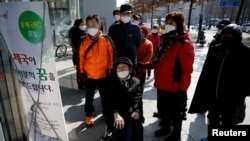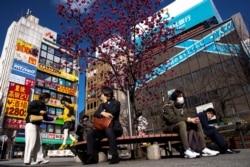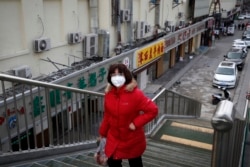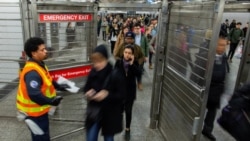Officials around the world Thursday were taking increasingly stringent measures to combat the spread of the coronavirus.
The Palestinian Authority became the latest governing body to take such steps. Palestinian President Mahmoud Abbas declared a state of emergency, shutting down schools for 30 days and closing the Church of the Nativity in Bethlehem after seven coronavirus cases were confirmed in the city. These were the first cases in the Palestinian territories.
Closing the church in the town that worshippers say was Jesus' birthplace will devastate Bethlehem’s vital tourism industry, and it came just weeks before Easter.
Elsewhere, Australia joined China and Iran in banning travel from South Korea, which has the largest number of coronavirus cases outside China.
Indonesia restricted travel from parts of South Korea as well as two other hard-hit nations, Iran and Italy. Both of those nations have shut down schools.
The virus also continued to roil world markets, as investors remained nervous about the outbreak and how it might spread.
On Wall Street, the Dow Jones industrial average plummeted 970 points to close at 26,121.28 — a 3% loss after soaring nearly 1,200 points Wednesday. The S&P 500 and Nasdaq Composite also experienced 3% losses, while British, French and German indexes were all down more than 1%.
At his daily virus briefing, World Health Organization chief Tedros Adhanom Ghebreyesus again stressed the seriousness of a virus about which scientists still know little.
"This is not a drill. This is not the time for giving up, this is not a time for excuses," Tedros said. "Countries have been planning for scenarios like this for decades. Now is the time to act on those plans."
The threat appeared to be waning in China, where the outbreak erupted in December. The WHO said Thursday that there were about 17 times as many new cases outside China now as there were inside China itself.
Hundreds of patients were being released from Chinese hospitals, and shuttered factors were starting to reopen. But Chinese President Xi Jinping has called off a scheduled state visit to Japan, where Tokyo has declared that all visitors from China and South Korea must be placed under quarantine.
The United Nations said the virus had disrupted classes for nearly 300 million students worldwide, from preschool through 12th grade. That number did not include colleges that have also been shuttered.
In the United States, with more than 150 confirmed cases of the virus and 12 deaths, the Senate on Thursday followed the House in approving $8.3 billion in emergency spending to combat the outbreak, including money for developing a vaccine. It now goes to President Donald Trump for his signature.
Trump took some heat Thursday from health experts after he told Fox News that the WHO was sending out false information and suggested infected patients were safe going to their jobs in offices and stores.
"A lot of people will have this and it's very mild. They'll get better very rapidly," Trump told Fox's Sean Hannity. “They don't even see a doctor, they don't even call a doctor. You never hear about those people. We have thousands or hundreds of thousands of people that get better, just by, you know, sitting around and even going to work. Some of them go to work, but they get better.”
The U.S. Centers for Disease Control and Prevention said the coronavirus is highly transmissible and that people who are sick must stay home.
California, Florida and Hawaii — all huge tourism sites — have declared states of emergency. Washington state, with 11 of the 12 U.S. deaths, has also declared a statewide emergency. Most of the deaths in Washington took place in a single nursing home near Seattle.
Also Thursday, the U.S. Coast Guard used helicopters to drop coronavirus testing kits to passengers and crew aboard the Grand Princess, which was anchored off California. Two cases have been linked to passengers who sailed aboard the ship last month.
As of late Thursday, there were more than 98,000 COVID-19 cases worldwide and at least 3,300 deaths.








